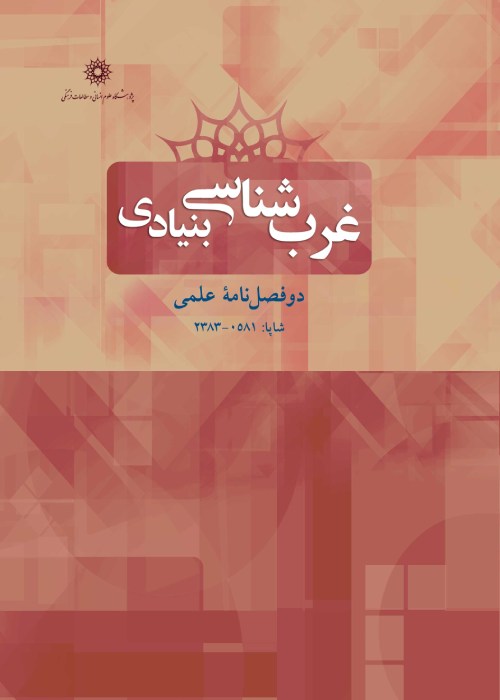A study on the theory of genius in Kant's third critique based on the meanings of Bildung
The aim is to study the dimensions and meanings of Bildung in Kant's theory of genius in the third critique with a descriptive and analytical method.
On the other hand, genius is designed to resolve the gap between the beautiful in art and in nature in the third review. On the other hand, the presentation of genius is considered a way to turn from aesthetics to the philosophy of fine art in this critique. When studying Kant's theory of genius, we realize that the role of imagination and aesthetic ideas under a certain concept of a product as an end in it is stronger than the direct intervention of understanding. Considering the harmony of faculties in the discussion of genius shows the harmony of imagination and understanding. The induction in the theory of genius in the metaaesthetics of the ideal of beauty in art is determined from the point of view of the creative artist. The goal related to beauty in art supports the formation and agreement of imagination and understanding. The study of ideas in the third critique shows that the idea has multiple aspects. The third aspect is found in genius: a positive, secondary presentation of an idea that is implemented through the creation of "another" nature, which here is the aesthetic ideas. The description of the connection between the aesthetic idea and morality in genius reveals that artistic beauty and morality come together. The beautiful thing in art is not less than the beautiful thing in nature, but "is a symbol of morality." In this way, the separation of two types of beauty, i.e. natural and artistic beauty, is overcome. The explanation of the socialization or grouing experience of genius consists in calling and expecting the harmony and agreement of genius faculties in another genius. In genius, without losing the exceptional and unique character of genius, he/she gives universal and general value to the agreement it produces and must be able to transfer its power and life to other powers of the audience. Taste and judgement have a disciplining role in genius and a part of education and training in human faculties. Art is the product of artistic genius, which has an educational aspect in terms of technique and style. Genius is not a teachable talent in terms of the expantion of ideas, amazing substance, metamorphosis and transformation o genius. In addition, in order to reach social results in the sense of Bildung, we can address the subject and his social role in an emerging civil society according to Kant, whose first step is taken in the face of beauty and common sense. This critique places taste in a larger context than human society. Humanity is characterized by a sense of sociability and the capacity to convey pleasure and thought. Beauty in nature and in art, a central role in fostering social connection between different people; And it is closely related to the cultivation of moral sense.
The study of the theory of genius in the third criticism based on the meanings of Bildung shows that this term was more than ideal educational perfection for Kant. According to Bildung meanings, genius has the following aspects:1) Formation of the harmony of imagination and understanding; The common sense of genius and the agreement of the audience's faculties in accordance with the faculties of genius, which is coordinated with nature. 2) Cultivating faculties, cultivating the mind, spirit of a genius and calling other geniuses, 3) Educational role of the product of genius in terms of technique and style, 4) Form; receiving the reflective form of beautiful art or the product of genius by imagination, 5) Bilde/image; Beautiful art as an image through the aesthetic idea as a mediator of cultural meanings and values, 6) education; propaedutic in cultivating faculties of mind and moral training of the audience for higher and superior moral ability, 7) preparation for social community based on a common sense in the path of culture development rely on consensual agreement (individual faculties and people together).
This research shows that the issue of creating a work of art and the genius of a creative artist is placed in the path of Kant's anthropology.
The research suggests to focus on the harmony of faculties among all the meanings of Bildung for genius. In this case, the condition of supersensible unity of faculties comes from the unconscious substrate in the Leibnizian sense; That is, the place that maintains the relations that the subject establishes both internally and externally; A place based on free, indefinite and unconditional relationships. In this case, the formative pattern of agreement between powers in genius comes from that substrate and shows the extraordinary unity of all faculties together as a living unity. As a result, Kant's debate on genius is directed towards expressive process of individuality, individual difference and individuation; It opens up to the future philosophy and finds its own educational paths and training results.
Bildung , formation , bilde , image , free harmony , Cultivation
- حق عضویت دریافتی صرف حمایت از نشریات عضو و نگهداری، تکمیل و توسعه مگیران میشود.
- پرداخت حق اشتراک و دانلود مقالات اجازه بازنشر آن در سایر رسانههای چاپی و دیجیتال را به کاربر نمیدهد.


